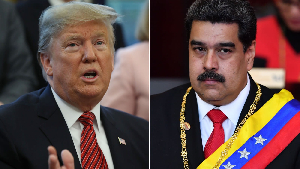On 20th May, Probate was granted by the High Court, Accra on the estate of Dr. John Ackah Blay-Miezah, to Francis Kaku Mensa, on a seemingly uncompleted will executed in part in 1988, four years before the death of the flamboyant Ghanaian who was rumoured to be probably one of the richest men that ever lived. According to the report carried by the Statesman, the court appears to have bent its own rules to hasten the grant of probate to F.K. Mensah, as sole executor and trustee, even though Dr. John Robert Kells filed a caveat against the issue of probate.
Dr. Kells was a party to the 8-year lawsuit by his presentation of a purported 1989 will of Blay-Miezah, which was thrown out by the review panel of the Supreme Court earlier this year as bogus.
According to the will presented by F.K. Mensah and the late Dr. Ebenezer Ako Adjei of ?The Big Six? fame, the Blay-Miezah estate is valued at $96 million. The court rules state that a fee of about 1 per cent of the gross value of an estate must be paid to the court before probate can be granted.
Yet, a search by The Statesman has shown that the gross value figure placed on F.K. Mensah?s probate has been mysteriously reduced to ?65 million (or $7,000). Thus only an estate duty of ?350,000 was paid to the court.
Mrs. Justice Felicity Amoah and Grace Ritcher, Chief Registrar had attested the probate, apparently without any judicial reference to the caveat that was placed on it. Normally, the High Court is supposed to rule on a caveat before granting probate. But this appears not to have been done in this instance.
The authenticity of the supposed Will of Blay-Miezah of 8th May 1988 is also under grave doubt. F.K. Mensah and his team of lawyers are said to have traveled to Switzerland with the purpose of unlocking the mystery surrounding the purported billions of dollars lodged in various accounts in the West under a trust fund controlled by Dr. Blay-Miezah until his death. But reports point to a trip in futility.
Some sources close to the saga are adamant that the quest of F. K. Mensah or the family of the late Blay-Miezah to lay their hands on the funds will draw a blank. This is because, they say, Blay-Miezah, per se, was not the beneficiary of the purported multi-billion dollar chest at UBS and other banks.
It is therefore suggested that only the Government of Ghana, with support from the UN and other influential world leaders, can get the banks to admit to holding onto the funds, and release them to Ghana and the other beneficiaries, including individuals, many of them in the United States and Ghana.
But, sources in government confess that the NPP is very cautious about getting involved because of the history of the Blay-Miezah money. Previous governments including the PNDC got their fingers burnt tracing the funds. A notable one was the extra effort put in by PNDC finance minister, Dr. Kwesi Botchwey and Captain Kojo Tsikata (Rtd). The PNDC regime spent much time and energy on the case before giving up.
But, sources close to the late Blay-Miezah said he chose to run rings around the PNDC because he feared their intentions on the use of the money once they got their hands on it. The PNDC?s concentration on the Blay-Miezah billions makes the $1bn IFC loan debacle pale into insignificance.
Yet several influential people, both in Ghana and abroad, attest to the existence of the fund. There are, however, conflicting views as to how or who can bring the money home. A view increasingly gaining ground is that it may only come if the government takes it up. But sources within government takes also retort that government would only get involved if it is presented with credible evidence about the existence of the Blay-Miezah billions.
Bizarrely, parties including American investors, Irish doctors, First Republic politicians and family members of the late Blay-Miezah have been fighting for about a decade as to who must have the right to bring the money home. Ironically, many of the players are too poor and may not have even got a whiff of a million dollars in their entire life. Yet, whether it is poor avarice or sheer stubbornness, over the years there has been little or no stomach to bang their heads together and work as a team to unlock the mystery, and bring the so-called billions of dollars home to Ghana. Thus, whilst they squabble among themselves, the money, if it indeed exists, has been resting in banks in the West, where the banks have naturally made billions of dollars from it and continue to.
As a mark of the apparent greed associated with the chase after the funds, several shady schemes and devises have trailed the funds. For example, one of the two attesting witnesses to the will that probate was granted to in May, James Kaku, has signed a declaration saying, contrary to the Wills Act, 1971, (Act 360), that his signature was appended to the uncompleted document after the death of the testator, Blay-Miezah. Section 2(3) of Act 360 provides that two or more witnesses present at the same time must witness the signing of a will by the testator, and the signatures of both witnesses must be signed in the presence of the testator.
Also on December 11, 2000, Nana Asemda VI, Head of the Blay-Miezah family, also made a declaration which alleged that he was instrumental in the alleged smuggling of James Kaku?s signature onto the disputed will of 1988 in early 1993.
The 1988 will was challenged by the caveat filed by Dr. Kells? lawyer, William Adamuah-Bossman. The Will was not expressly proved in court, but probate was instructed by the Supreme Court to be granted to it, after a subsequent will of 1989 was anonymously alleged by the Supreme Court to be a forgery.
While F.K. Mensah holds what has been described as a ?one-logged probate? two months after the probate he is unable to bring the purported billions of dollars left behind by Blay-Miezah.
General News of Wednesday, 23 July 2003
Source: .












